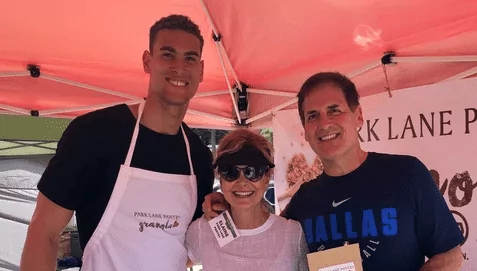by Elaine Pearlman, ParkLane Pantry
Every so often one thing leads to another and such was the case with me and ParkLanePantry granola. Call it kismet (fate) or bashert (meant to be), I’m not sure how it happened so quickly but the stars aligned for me to share my wellness journey from breast cancer with my community through my small batch granola.
Where It Started
My life in Dallas began in 1986 as a young lawyer with Cowles and Thompson PC, then continued as a mother and community volunteer while I raised my children. Now young adults, my 27-year-old son Ryan lives in Dallas and works in the energy business, while my 24-year-old daughter, Morgan, is in her first year at Stanford Law School. Mid-life, after a blurred year from 2017-2018 spent dealing with breast cancer, an opportunity arose that spoke to my soul; my second act started then and continues to unfold in real-time every day.
My love affair with granola began in 1987 at the Bluebonnet Cafe and Grocer on Lower Greenville Avenue in Dallas. I became a forever granola girl back then and began my quest to find unique homemade granola wherever my travels take me. Over the years, my hunt for the perfect blend for my pallet led me to develop my recipes. I eat my original concoctions daily on yogurt or oatmeal, or alone as a simple workout snack – and of course, I happily share the latest batches with family and friends.
The Diagnosis
Life changed dramatically for me the day I received my breast cancer diagnosis and discovered I carried the BRCA 2 mutation. My determination to nourish my body led me to a holistic approach to food. I now eat a gluten-free, nutritionally dense, and fat-adaptive diet. I learned sugar feeds cancer cells that can make cancer grow.
The medicine prescribed for me to take for the next 10 years caused excruciating joint pain. I learned from my oncology nurse that a gluten-free diet incorporating healthier fats could reduce pain.
I adopted an all-organic, cancer-fighting diet of only gluten-free whole grains, and no sugar, alcohol, or dairy. In between my surgeries and during the recovery phase, my daughter and I played around in the kitchen to come up with a granola recipe that did not contain the gluten, dairy, soy, and sugars found in most granola on the market – and just as importantly, did not sacrifice taste.
During this difficult time, my new homemade granola offered me the crunch I craved with a tad of sweet flavor.
How I Realized My Second Act – ParkLanePantry Granola
This was the start of my journey that finally led to the perfect granola recipe. It met all my requirements – gluten-free, vegan, non-GMO, free of canola oil, grains, soy, and refined sugar with good flavor, good crunch, and nourishing all-natural ingredients.
Fast Forward to early 2019. My sister introduced me to Tiffany Lustig, an executive MBA student at SMU who asked me if she could “hypothetically” launch my granola as a start-up for her entrepreneur class at SMU. I agreed and soon thereafter she conducted a blind taste test featuring all the top market granolas, gluten-free and otherwise. To my surprise, ParkLanePantry scored highest on taste and texture. We decided to officially launch my product as a real business, starting on April 27th of this year and we haven’t sat still since.
I enjoy this venture every day. I wake up excited to share my small batch of granola because I infuse each batch with Emoto’s positive vibes of love and light. ParkLanePantry allows me to share my wellness journey with others which created a healing outcome for me and a delicious product for all.
About the Author: Elaine Pearlman

Elaine Pearlman lives with her husband, Trevor, in Dallas, where she prepares and distributes her wonderfully tasty and healthy granola. Check out her website for inspiration, recipes, and a list of locations where ParkLanePantry granola can be purchased, or contact Elaine at orders@parklanepantry.com
A portion of all proceeds from ParkLanePantry is donated to the Dwight Powell Children and Family Support Fund to help patients and their children cope with cancer.
FAQS about the BRCA2 Mutation
Here are common questions we hear about the BRCA2 Mutation.
What is the BRCA2 mutation?
The BRCA2 mutation is a genetic alteration in the BRCA2 gene, which is responsible for producing a protein that helps suppress the growth of tumors. Mutations in this gene can increase the risk of developing certain cancers, particularly breast and ovarian cancers.
How common is the BRCA2 mutation?
BRCA2 mutations are less common than BRCA1 mutations but can still contribute to an increased risk of cancer. The prevalence of BRCA2 mutations varies across different populations.
What cancers are associated with the BRCA2 mutation?
The BRCA2 mutation is primarily associated with an increased risk of breast cancer in both men and women, as well as ovarian and prostate cancers. Additionally, it can raise the risk of other cancers like pancreatic and melanoma.
How is the BRCA2 mutation inherited?
The BRCA2 mutation is inherited in an autosomal dominant manner. This means that if one parent carries the mutation, there is a 50% chance of passing it on to each child. Both males and females can inherit and transmit the mutation.
Who should consider genetic testing for BRCA2 mutations?
Individuals with a family history of breast, ovarian, prostate, or pancreatic cancer, especially if the cancers occurred at a young age, are advised to consider genetic testing. Additionally, those with certain ethnic backgrounds may have a higher risk.
What is the importance of genetic counseling before testing?
Genetic counseling helps individuals understand the implications of genetic testing, the potential results, and the medical options available. It allows individuals to make informed decisions about whether to undergo testing and how to interpret the results.
What are the potential results of BRCA2 mutation testing?
Testing can yield different results:
Positive result: A mutation is detected, indicating an increased risk of certain cancers.
Negative result: No mutation is found, reducing the likelihood of an inherited risk.
Variant of uncertain significance (VUS): A genetic change is detected, but its significance is unknown.
What can individuals with a BRCA2 mutation do to manage their risk?
Depending on the mutation and individual circumstances, options may include increased surveillance (more frequent screenings), preventive medications, and risk-reducing surgeries (such as mastectomy or oophorectomy).
Can men with the BRCA2 mutation develop breast cancer?
Yes, men with the BRCA2 mutation are at an increased risk of developing breast cancer. Though breast cancer is less common in men, those with the mutation should be aware of the risk.
Can the BRCA2 mutation be treated?
The mutation itself cannot be treated, but knowing about the mutation can help individuals and healthcare providers implement risk reduction strategies and appropriate surveillance to catch potential cancers early when they are more treatable.
Keep in mind that medical knowledge is constantly evolving, so it’s important to consult with a healthcare professional or genetic counselor for the most up-to-date and personalized information regarding the BRCA2 mutation. This article is not intended as medical advice.
Read Other “Second Act” Articles










